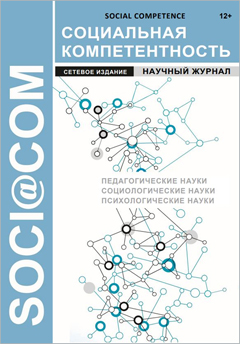Prospects for the integration of new digital technologies into modern education to improve its effectiveness
DOI:
https://doi.org/10.24866/2658-5855/2025-2/42-51Keywords:
digitalization of education, digital footprint, Big Data, blockchain, educational technologies, personalized learning, digital transformation, innovative approaches in educationAbstract
The article addresses the problem of integrating new digital technologies into modern education to enhance its effectiveness and quality. The purpose of the study is to summarize theoretical and practical approaches to the use of digital tools in educational environments and to identify key directions and barriers to the digital transformation of education. The research methods include analysis of scientific literature and publications, comparative analysis of different approaches, generalization of pedagogical experience, systematization, and data interpretation. The results confirm that the integration of Big Data technologies, digital footprint analysis, and blockchain systems contributes to the creation of personalized learning pathways, improves transparency and security of educational processes, and optimizes educational program management. The key conclusion is the need for a comprehensive and strategic approach to the digitalization of education, considering organizational, regulatory, and ethical aspects. The novelty of the article lies in the development of a conceptual model for the interaction of key digital technologies in the educational system aimed at increasing its efficiency and sustainability in the digital era.
Downloads
References
1. Ghavifekr S., Razak A.Z., Ghani M.F., Ran N.Y., Meixi Y., Tengyue Z. ICT Integration in education: Incorporation for teaching & Learning improvement // Malaysian Online Journal of Educational Technology. 2014. № 2(2). P. 24–45. URL: https://files.eric.ed.gov/fulltext/EJ1086419.pdf
2. Consoli L., Schmitz M.L., Antonietti C. et al. Quality of technology integration matters: positive associations with students’ engagement and digital competencies // Education and Information Technologies. 2024. Vol. 30. Article 13118. URL: https://link.springer.com/article/10.1007/s10639-024-13118-8
3. Mallick S., Gangopadhyay A. Proactive and reactive engagement of artificial intelligence methods for education: A review // Frontiers in Artificial Intelligence. 2023. Vol. 6. URL: https://arxiv.org/pdf/2301.10231
4. Mdhlalose D., Mlambo G. Integration of technology in education and its impact on learning and teaching // Asian Journal of Education and Social Studies. 2023. Vol. 47(2). P. 54–63. URL: https://papers.ssrn.com/sol3/papers.cfm?abstract_id=517812
5. Alruthaya A., Nguyen T.T., Lokuge S. The application of digital technology and the learning characteristics of generation Z in higher education. URL: htpp://arXivpreprint arXiv:2111.05991.2021
6. Afzal B., Gani A., Daud A. Towards smart education through the Internet of things: A review // ACM Computing Surveys. 2024. Vol. 56(2). Article 26. URL: http://arXivpreprint arXiv:2304.12851.2023
7. Awedh M., Mueen A., Zafar B. Using socrative and smartphones for the support of collaborative learning. URL: http://arXivpreprint arXiv:1501.01276.2015
8. Higgins S., Xiao Z., Katsipataki M. The impact of digital technology on learning: A summary for the education endowment foundation. Durham: Education Endowment Foundation and Durham University, 2012. URL: https://www.microsoft.com/isapi/redir.dll?prd=ie&ar=windowsmedia
9. Амелина Т.В. Оптимизация образовательного процесса: интеграция цифровых образовательных технологий с применением научно обоснованных методов преподавания // Цифровая гуманитаристика и технологии в образовании (DHTE 2023): сб. статей IV Международной научно-практической конференции. 16–17 ноября 2023 г. / Под ред. В.В. Рубцова, М.Г. Сороковой, Н.П. Радчиковой. Москва: ФГБОУ ВО МГППУ, 2023. С. 616–632.
10. Андрюхина Л.М., Садовникова Н.О., Уткина С.Н., Мирзаахмедов А.М. Цифровизация профессионального образования: перспективы и незримые барьеры // Образование и наука. 2020. Т. 22, № 3. С. 116–147. DOI: https://doi.org/10.17853/1994-5639-2020-3-116-147
11. Getenet S., Cantle R., Redmond P., Albion P. Students' digital technology attitude, literacy and self-efficacy and their effect on online learning engagement // International Journal of Educational Technology in Higher Education. 2024. Vol. 21. Article 3. URL: https://educationaltechnologyjournal.springeropen.com/articles/10.1186/s41239-023-00437-y
12. Свидетельство о государственной регистрации программы для ЭВМ № 2015617028 Российская Федерация. Адаптивная образовательная среда: № 2015613900: заявл. 12.05.2015: опубл. 26.06.2015 / Е.Н. Бояров, В.П. Соломин, П.В. Станкевич; заявитель Федеральное государственное бюджетное образовательное учреждение высшего профессионального образования «Сахалинский государственный университет».
13. Akram H., Abdelrady A.H., Al-Adwan A.S., Ramzan M. Teachers' perceptions of technology integration in teaching-learning practices: A systematic review // Frontiers in Psychology. 2022. Vol. 13. Article 920317. URL: https://www.frontiersin.org/journals/psychology/articles/10.3389/fpsyg.2022.920317/full
14. Ghavifekr S., Rosdy W.A.W. Teaching and learning with technology: Effectiveness of ICT integration in schools // International Journal of Research in Education and Science. 2015. Vol. 1(2). P. 175–191. URL: https://files.eric.ed.gov/fulltext/EJ1105224.pdf
15. Как работает блокчейн: простыми словами // SCUPRO. URL: https://sky.pro/wiki/javascript/kak-rabotaet-blokchejn-prostymi-slovami/ (дата обращения: 10.05.2025).
Downloads
Published
Issue
Section
License
Copyright (c) 2025 Евгений Николаевич Бояров

This work is licensed under a Creative Commons Attribution-NonCommercial-NoDerivatives 4.0 International License.


